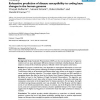Free Online Productivity Tools
i2Speak
i2Symbol
i2OCR
iTex2Img
iWeb2Print
iWeb2Shot
i2Type
iPdf2Split
iPdf2Merge
i2Bopomofo
i2Arabic
i2Style
i2Image
i2PDF
iLatex2Rtf
Sci2ools
100
click to vote
BMCBI
2008
2008
Exhaustive prediction of disease susceptibility to coding base changes in the human genome
Background: Single Nucleotide Polymorphisms (SNPs) are the most abundant form of genomic variation and can cause phenotypic differences between individuals, including diseases. Bases are subject to various levels of selection pressure, reflected in their inter-species conservation. Results: We propose a method that is not dependant on transcription information to score each coding base in the human genome reflecting the disease probability associated with its mutation. Twelve factors likely to be associated with disease alleles were chosen as the input for a support vector machine prediction algorithm. The analysis yielded 83% sensitivity and 84% specificity in segregating disease like alleles as found in the Human Gene Mutation Database from non-disease like alleles as found in the Database of Single Nucleotide Polymorphisms. This algorithm was subsequently applied to each base within all known human genes, exhaustively confirming that interspecies conservation is the strongest facto...
Related Content
| Added | 09 Dec 2010 |
| Updated | 09 Dec 2010 |
| Type | Journal |
| Year | 2008 |
| Where | BMCBI |
| Authors | Vinayak Kulkarni, Mounir Errami, Robert Barber, Harold R. Garner |
Comments (0)

